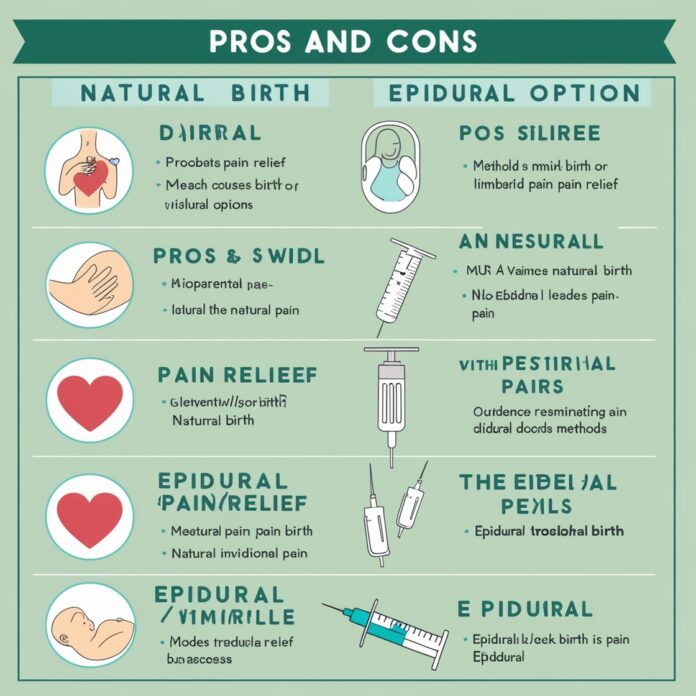One of the most difficult decisions that a woman expects from pregnancy is natural birth vs epidural. Understanding both natural birth and epidural – along with its pros and cons – will help you come to a decision that best fits your comfort level and birth plan. In this post, we will look at both options: what to expect during natural birth, how does an epidural work, and the pros and possible risks associated with each.
Understanding Natural Birth
Natural birth refers to the process of giving birth without the use of pain-relieving medications. It generally includes breathing techniques, massage, and positions of labor that support lowering the pain threshold while keeping one relaxed.
Advantages of Natural Birth
- More control: Natural birth usually makes women feel more in control with labor since they remain totally aware and involved.
- Faster recovery time: As no medications are within the body, recovery generally goes a bit faster, without any after-effect of anesthesia.
- Immediate bonding: Natural birth permits skin-to-skin contact and immediate breastfeeding, which is highly advantageous for a good initial bond.
Disadvantages of Natural Birth
- Pain management: During labor pains may be more sharp and unbearable for some woman.
- Limited options for complications: If labor becomes complicated, options may be limited without the assistance of medications such as an epidural.
What Is an Epidural?
An epidural is a type of pain relief given through a catheter placed in the back, lower. It numbs the lower body and takes away the pain of labor while the mother stays awake and alert.
Pros of an Epidural
- Effective pain relief: Epidurals result in considerable pain relief during labor, which enables one to rest and thus conserve energy for the time of delivery.
- Decreased anxiety: The knowledge that one will get pain relief may reduce tension and result in a feeling of relaxation.
- Flexibility: In case of complications, an epidural facilitates a smoother transition to a cesarean section, if necessary.
Disadvantages of an Epidural
- Limited mobility: With an epidural, one can only walk or be mobile in labor. This might affect the progress of labor adversely.
- Possible side effects: Epidurals do have some short-term side effects, such as low blood pressure, headaches, or nausea.
- In a few cases, this medication may hinder the initial bonding and first breastfeed because of its residual effects.
Natural Birth vs. Epidural: What Are the Most Important Differences?
Pain Threshold
Consider your pain threshold and feelings about pain management sans intervention. While natural birth allows for the experience of delivering without medication, it takes a lot more mental and physical stamina. An epidural will take a lot of discomfort away but may keep you confined to a bed and add a little more time to labor.
Labor Length and Position
It may be easier to change positions during labor, because natural birth allows you to take any position that may help the progress of labor. This is probably impossible when you have an epidural because you may be required to spend your time in bed, something that may prolong labor and increase your chances of interventions like forceps and vacuum delivery.
Recovery Time
Where natural birth is often associated with quicker recovery times, epidurals can be associated with longer hospital stays because it requires monitoring once the medication has worn off. Furthermore, it may take longer to recover due to potential side effects from the epidural, such as headaches.
Health Issues
This includes your general health and current medical conditions. If you have low blood pressure, or if you have had any problems with your back, for example, you may wish to discuss with your healthcare provider whether an epidural is a safe option for you.
Risk Factors
Knowing the risks for each is important. For natural birth, you need to be prepared to cope with the full spectrum of labor pains, which can be intense. With an epidural, there is a slight risk of infection or complications from the anesthesia, but those are best discussed with your healthcare provider.
Making the Decision Natural Birth vs. Epidural
The choice between natural birth and an epidural depends on personal interest, pain threshold, and medical considerations. You may consider discussing options with your health provider and attending birthing classes to understand practically what each method entails.
Tips to Help You Decide:
- Talk to other moms: Sharing real-life experiences with other mothers can give insight and make one feel more ready for what is going to happen.
- Be prepared for both: Birth plans can change at any time; hence, inform yourself about both options, even though one may appeal to your liking.
- Trust your instincts: You know your body better than anyone else. Select an option that will make you be comfortable and ready to bring your baby into the world.
Natural birth versus epidural-there is no right or wrong, just what feels best for you. Weigh the pros and cons of each option and how each one aligns with your values and comfort level. With this in mind, you will face labor confidently and easily, knowing you have taken the path that best suits you and your baby’s needs.



